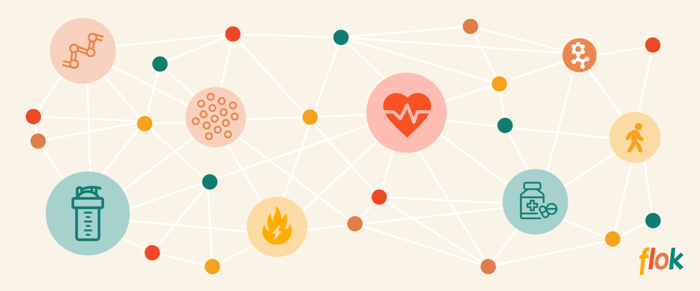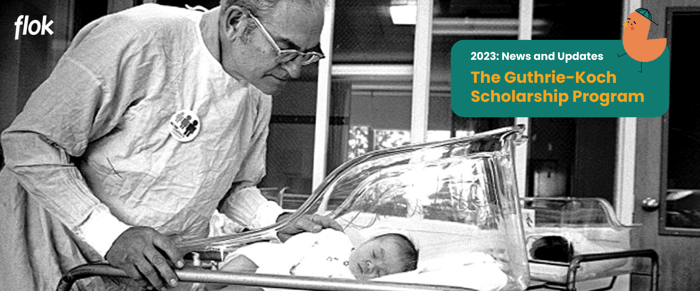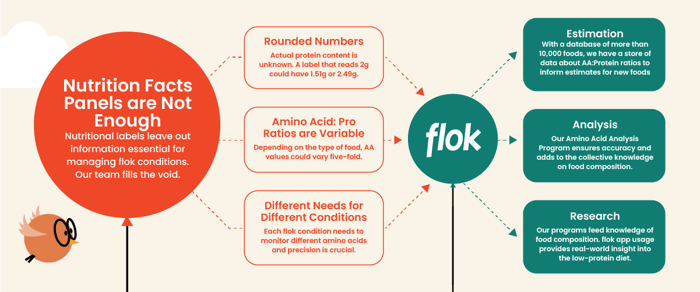Medicine stands on the cusp of major breakthroughs thanks to recent strides in synthetic biology and artificial intelligence. The pace of innovation in AI grows exponentially each year. However, for patients to benefit, the medical system must adapt dramatically. Currently, patient data - including medical records, genotypes, lab results, wearable device output and disorder management - sits trapped in separate silos or fails to be recorded at all. The power of big data biology springs from synthesizing these sources into a holistic view of both individuals and entire communities. With flok, we lay the foundation for research and solutions that would otherwise not be possible for years to come.
To accelerate the pace of innovation for our community, we are building the largest longitudinal dataset on inherited disorders of protein metabolism that exists. Our flok app and data platform aggregate a full range of measures – diet, activity, moods, symptoms, and biometrics– to create a comprehensive health profile. Behind the scenes, our machine learning technology, working on de-identified data, will shed new light on these conditions to guide research efforts and develop novel treatment avenues.
While our conditions are rare, they deserve a deeper study, advancements in care, and the advantages of artificial intelligence. With flok, we can influence science to revolutionize care and improve thousands of lives.
Our Vision
The team at flok has significant industry experience building global-scale artificial intelligence systems and understands the need for their application in the rare metabolic disorder space. We know AI can be used for the betterment of our understudied community and that current care models are ripe for this type of innovation. For this reason, we spent the last two years developing technology that takes a data-driven approach to propelling research forward for the metabolic community. We can generate significant interest in the study and treatment of these disorders by organizing our data in a way no other institution can – this is the power of patient-led science.
Our Approach
Our journey begins with gathering vital health information. Through our community’s engagement with the flok app, we will collect user-reported health measures on diet, activity, moods, and symptoms. We will synthesize these measures with biometrics captured by wearable technology and other relevant clinical information such as lab values, genotype, and co-occurring medical diagnoses. Collectively, the flok app will aggregate these data points over days, weeks, months, and years to build a comprehensive health profile of the user and an abundant dataset on the broader metabolic community.
flok's technology serves all inherited disorders of protein metabolism – Classical Homocystinuria, Maple Syrup Urine Disease, Organic Acidemias, Phenylketonuria, Tyrosinemia, and Urea Cycle Disorders – under the principle that we are better together. In medicine’s current state, none of the disorder communities have clinical research registries or long-term natural history studies to inform their care. flok's engagement with individuals and caregivers on a frequent basis will quickly amass a longitudinal dataset on these disorders to steer research. As community data fills in, we will gain perspectives never previously available for this rare community, and our discoveries in one condition group may lead to benefits and insights across disorders.
Research Pathways
As the flok’s health data grows, we will extract patterns and insights to guide researchers, clinicians, and industry. We strive to establish flok as a dedicated center of research in collaboration with other experts to inform clinical trials, publish reports, and ignite new interventions and treatment possibilities.
Our preliminary discussions with academics and industry leaders generated strong interest and support for flok’s unique, data-driven approach. We look forward to partnering with leading institutions and conducting our own internal research to enable:
- Longitudinal studies of disorder groups
- Natural history reports of disorders
- Improved clinical care with greater understanding of each disorder and their impact on other areas of health
- Clinical treatment evaluations
- Clinical trial recruitment and facilitation
Intervention Opportunities
With mounting data and flok’s AI and machine learning capability, we have potential to build from the growing body of research and create actionable insights for this population. At all times, the data belongs to the individuals who contribute it. All benefits – scientific and otherwise – will return to the community. These may include:
- Prediction of patient biomarkers and symptoms to avert health crises
- Modeling of health impacts of the conditions that were previously unrecognized
- Anticipation of response to treatments based on phenotype or genotype
With the advancement of our predictive models, medical researchers can identify valuable areas for intervention and design novel treatment approaches. As patient data continues to flow in, the possibilities for medical advancements based on our insights will increase exponentially.
At flok, we envision a future where data science revolutionizes understanding, treatment & care for inherited disorders of protein metabolism. The current approach is not good enough – there are no cures for our conditions, some of which may result in loss of life; current treatments are not accessible to many and lead to a loss of connection and care; and we lack an understanding of what aging with these disorders looks like. Through the flok app and research platform, we will illuminate the lived experience of these disorders and unearth vital information to influence the medical world. We have the commitment, community, and technology to define a standard of care and treatment–it’s time to find a better way.



